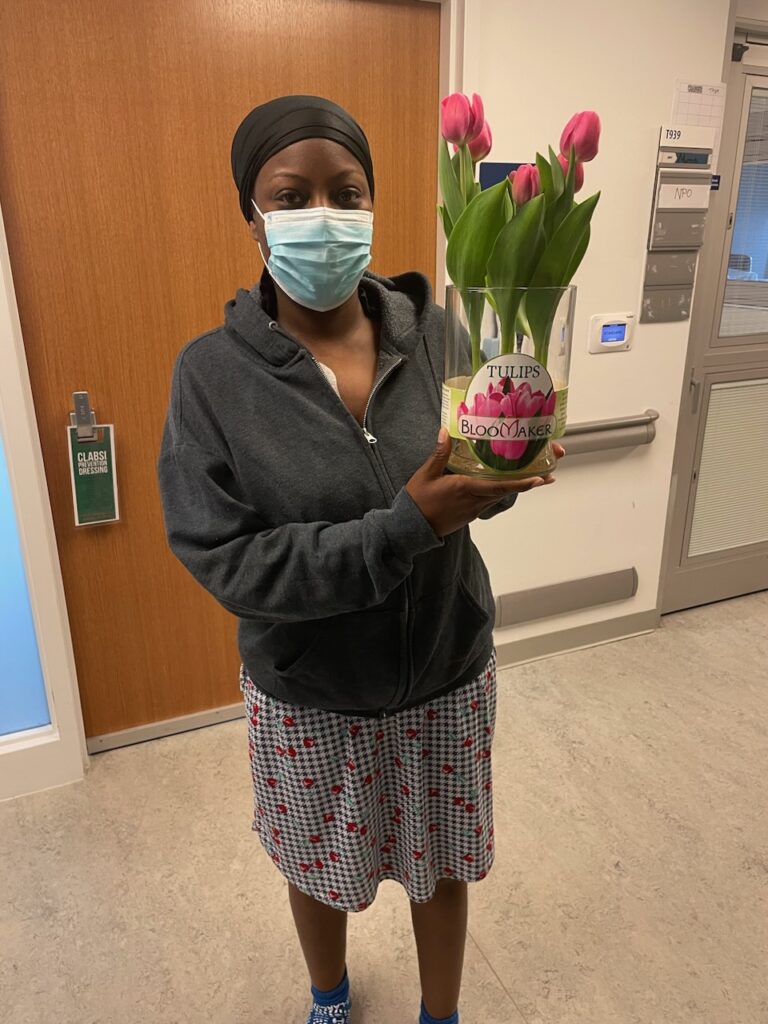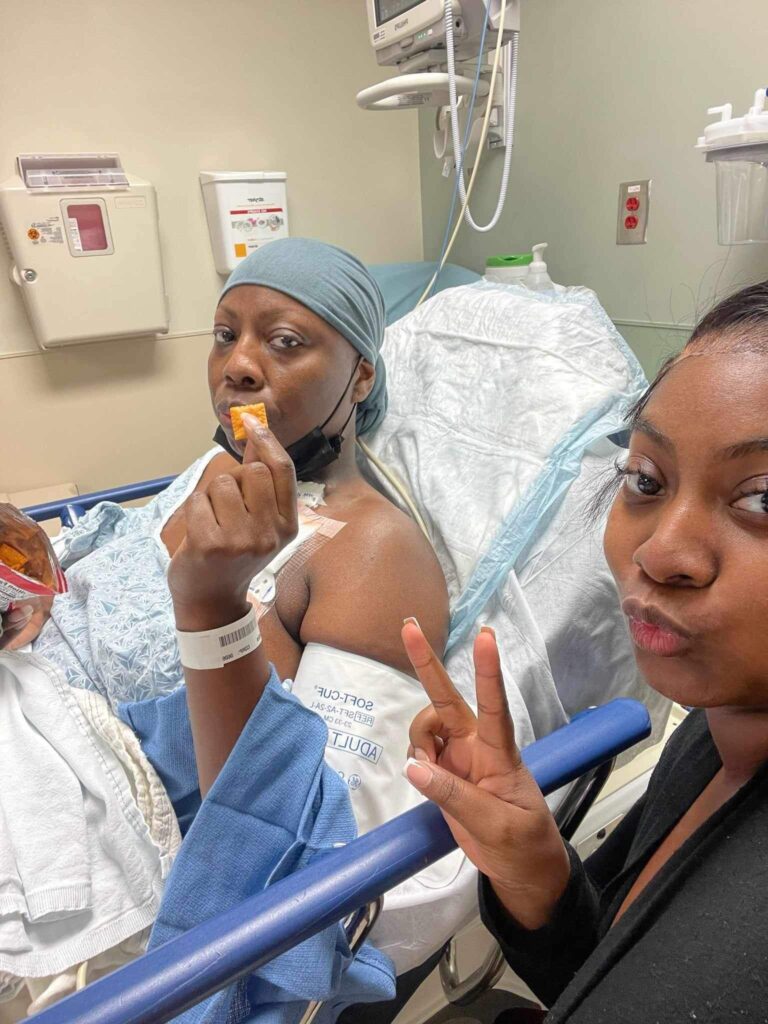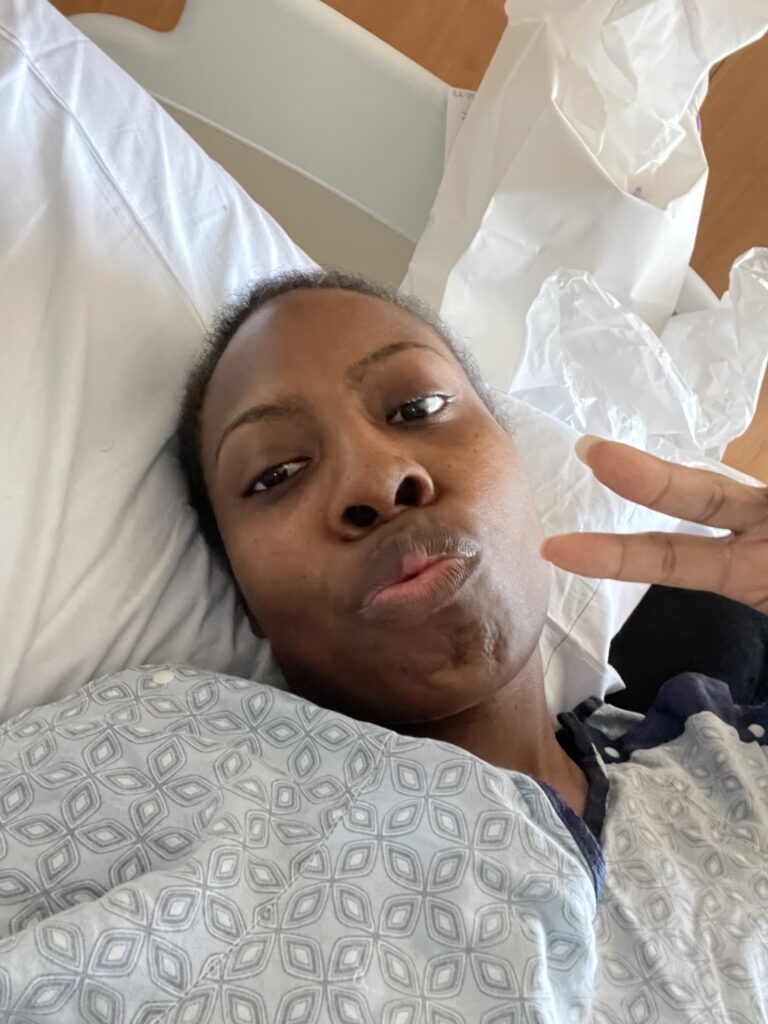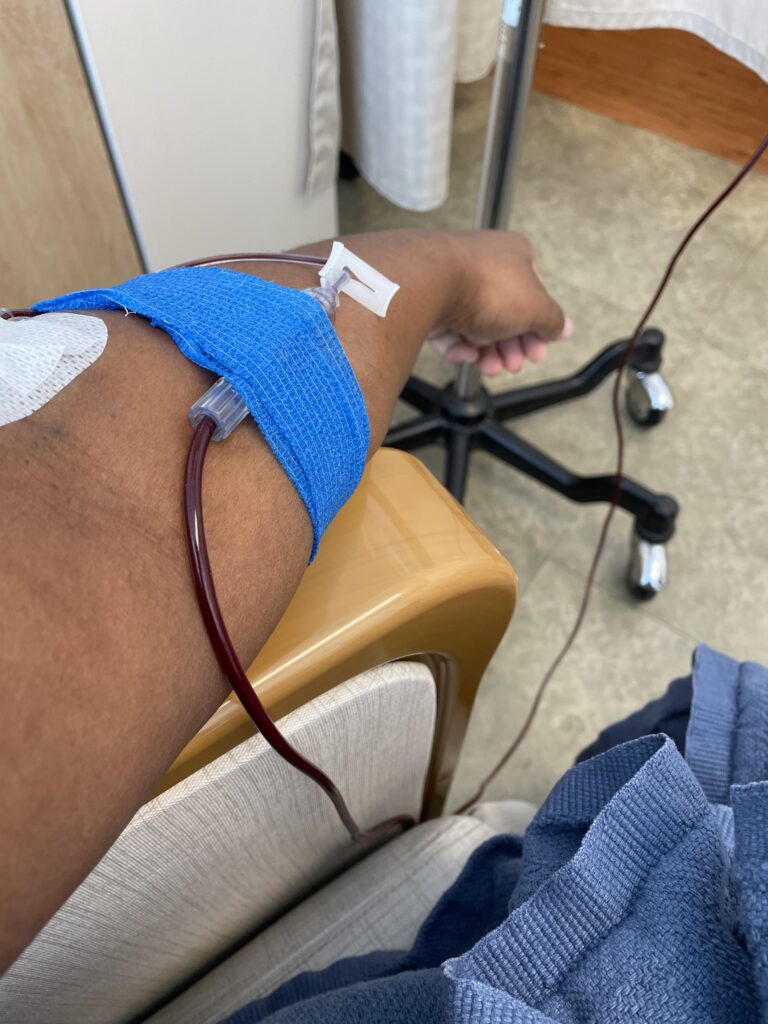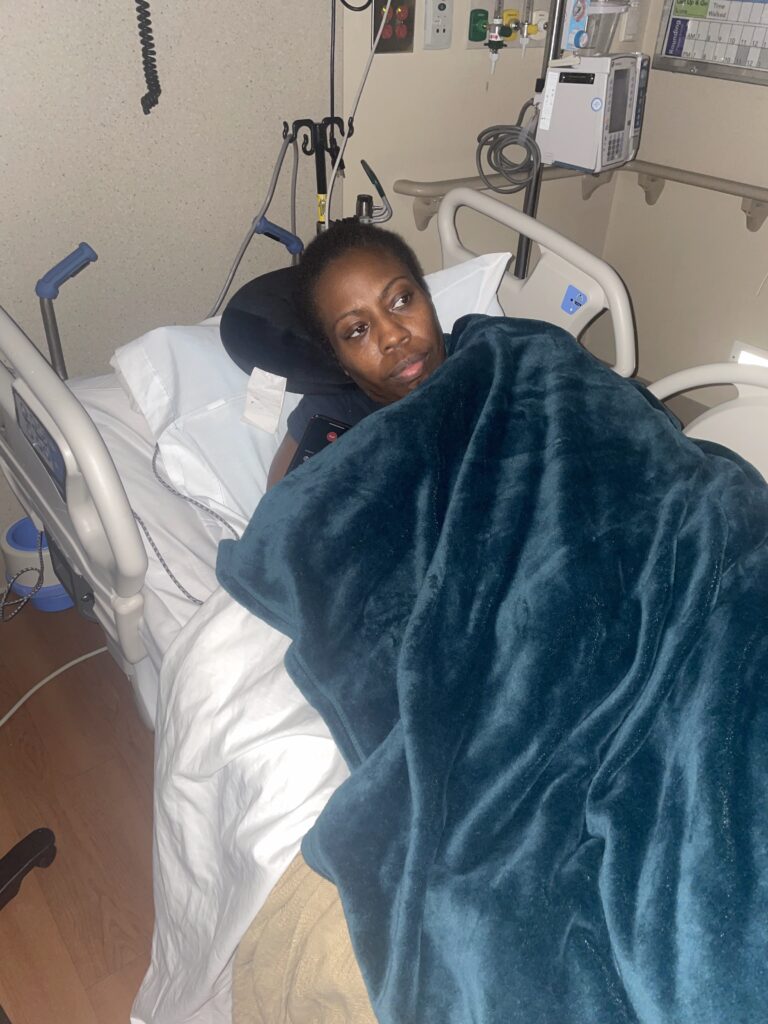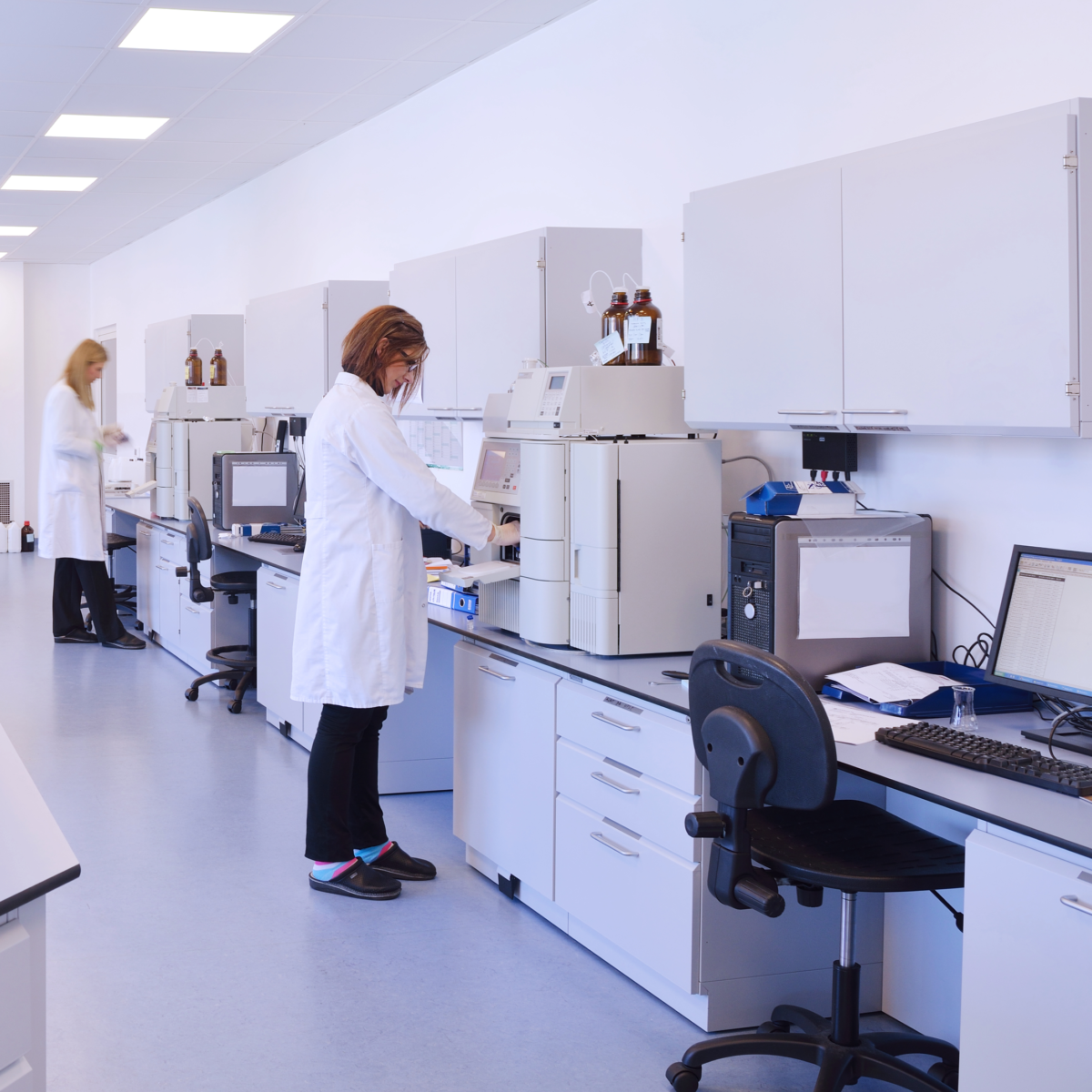Acute Myeloid Leukemia (AML) Stories: Mackenzie Navigates with Faith, Joy, and Family

Her first symptoms of acute myeloid leukemia (AML) hit Mackenzie in 2023, a medical student, when she experienced excessive bleeding while shaving and noticed an increase in fatigue when working out. Then during a clinical rotation, she suddenly vomited and then passed out. When Mackenzie finally got her diagnosis, she found herself more concerned about how her family members were taking the news.
There was a significant shift in Mackenzie’s diagnosis with the discovery of a biomarker. This provided her and her medical team information about risk levels of things like relapse. Her treatment experience began with induction chemotherapy, leading to remission, followed by two rounds of consolidation chemotherapy as she awaited a stem cell transplant.
While the transplant proved successful, Mackenzie’s leukemia relapsed on a molecular level six months post-transplant. She underwent more chemotherapy, but the treatment was unsuccessful, leading to a full relapse. She faced severe complications during her hospitalization, including pneumonia. Her faith, however, provided a glimmer of hope. After an unsuccessful initial clinical trial, she embarked on a new trial at MD Anderson, holding onto her optimism.
Watch her story and read more below to hear from Mackenzie on many topics:
- The importance of clinical trials and how they offer hope to patients, including herself.
- How she held onto her optimism even during the most difficult times.
- What she found solace in as she learned how to navigate losing her sense of self.
- Her top takeaway for others.
- Name:
- Mackenzie P.
- Age at Diagnosis:
- 23
- Diagnosis:
- Acute Myeloid Leukemia (AML)
- Symptoms:
- Shortness of breath
- Passing out
- Getting sick easily
- Bleeding and bruising quickly
- Treatments:
- Chemotherapy: induction and maintenance chemotherapy
- Stem cell transplant
- Clinical trials


Thank you to Kura Oncology for supporting our patient education program. The Patient Story retains full editorial control over all content.
This interview has been edited for clarity and length. This is not medical advice. Please consult with your healthcare provider for treatment decisions.
Interviewed by: Taylor Scheib
Edited by: Chris Sanchez
Every day, find something to be grateful for. Something that you love. Something that makes you happy, smile, or feel light.
Live for it, no matter what it is.
Introduction
My name is Mackenzie. I’m a medical student.
I was diagnosed with acute myeloid leukemia (AML) in 2023.


Before My Diagnosis
The first time I said, “This is weird, it’s time to get it checked out,” was on the first day of my second year of medical school. I was on a clinical rotation and we were in a patient’s room, but we weren’t performing any procedures. I threw up and passed out. It was quite random and embarrassing. I called my doctor to get blood work done.
Before that point, though, I had also been experiencing a few suspicious symptoms that I had been pushing to the side. When I shaved, my legs would bleed a little more than they usually did. I realized that it couldn’t have been anything else, like a razor that wasn’t sharp enough.
Additionally, I was an athlete in college and had been finding it harder to work out than I normally did. The passing out was the final straw.
I had been waiting all this time to figure out what was wrong and then to have it confirmed as cancer… it turned my world upside down.
I knew everything was going to change at that point.
My Diagnosis & Reaction
Because my family is in healthcare, my story might be somewhat different from other cancer patients’ stories. My dad is president of the hospital in my hometown where I got my biopsy, and my stepmom works there, too. Because of that, they got my results through MyChart, which I didn’t have then. Instead of getting a phone call and being told, “Hey, you need to come to the office right away,” I found out that I had cancer through them.
It was a normal Thursday in August 2023. I was back home from a simulation lab and was typing up the History and Physical form for the patient I had seen earlier that day. I heard a knock on the door, and my mom, dad, and stepmom walked in. I knew right away that it wasn’t good news.
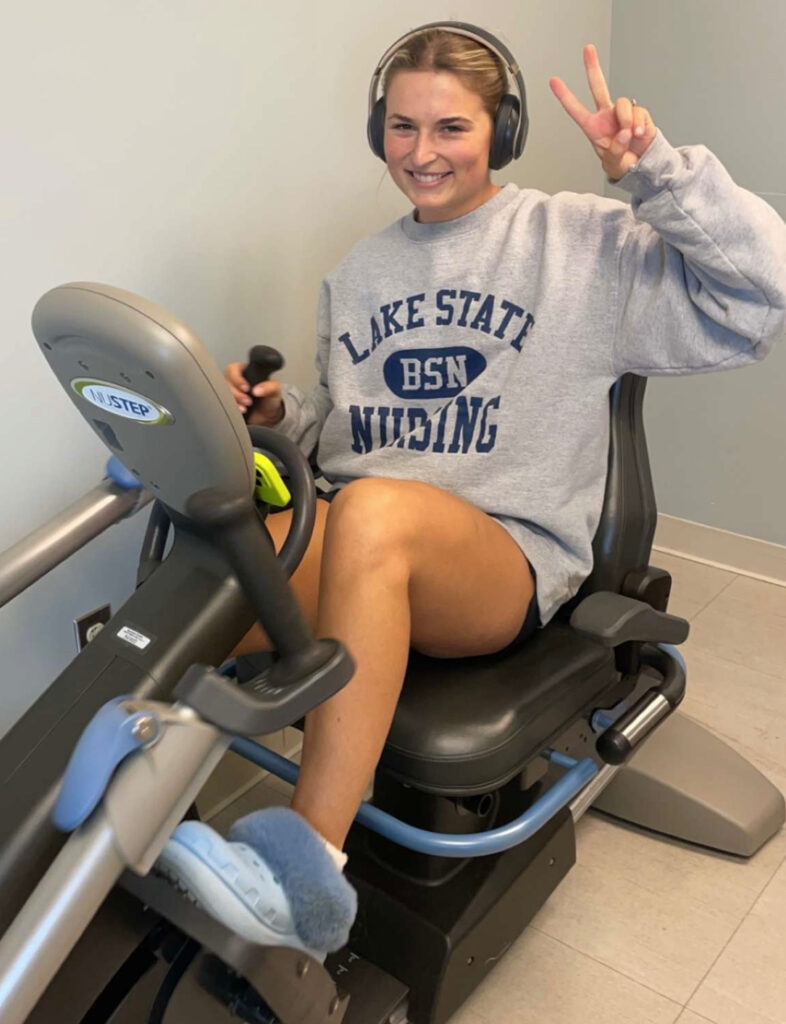

My dad was trying to talk, but he was crying. My stepmom looked at me and said, “It’s leukemia.” Part of me had known it all along, so I was almost prepared for it. But I wasn’t sad — I was mad. I had been waiting all this time to figure out what was wrong and then to have it confirmed as cancer… It turned my world upside down. I knew everything was going to change at that point.
When I received my acute myeloid leukemia diagnosis, I felt more hurt for my family and friends than for myself. In my line of work, I’ve made a few phone calls to inform other people of their diagnosis and they were very hard to do. My way of coping with this diagnosis for the longest time was trying to make sure that everyone else was okay and show how strong, brave, and optimistic I was. I believed that I was going to get through this, so I needed my friends and family to believe it, too.
Learning My AML Mutation
The doctors tested my bone marrow for different mutations and found out that I have a mutation for AML that means that I have a high risk of relapse. Patients can be at high, moderate, or low risk for relapse. Those at moderate to high risk might need to consider a stem cell transplant or might require a transplant. And I did have to undergo a transplant.
What was worrisome for me was that I had a first cousin who had acute lymphocytic leukemia (ALL) when she was little and a second cousin who had prolymphocytic leukemia (PLL) when he was in his 30s. I was worried for my sister and for my future kids. The doctors took a skin biopsy to try and determine if this mutation developed spontaneously in my leukemia cells or if it was an inherited mutation that was in my DNA. They determined that it was a spontaneous mutation that I won’t be passing down. I just got unlucky and wound up getting cancer.
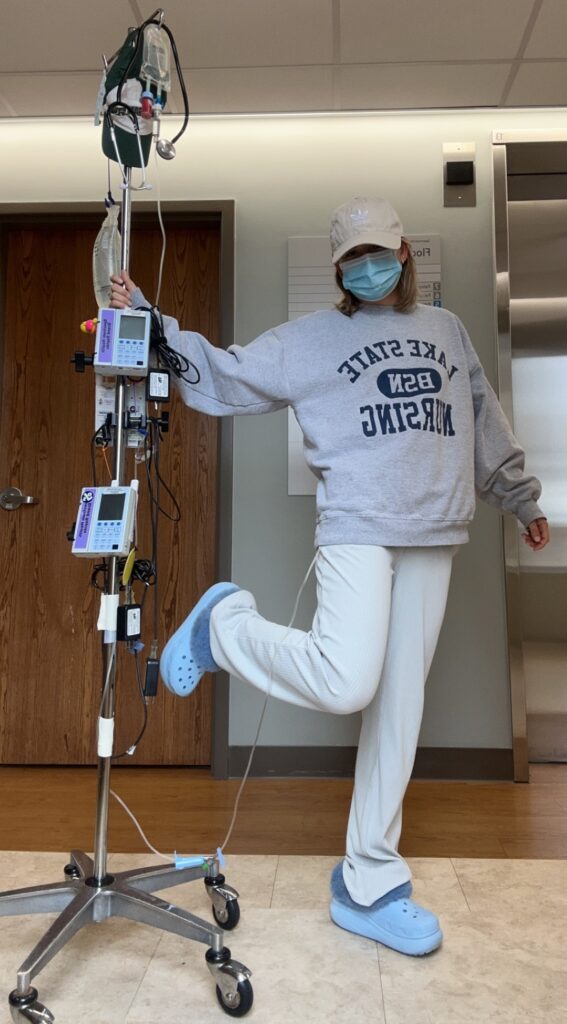
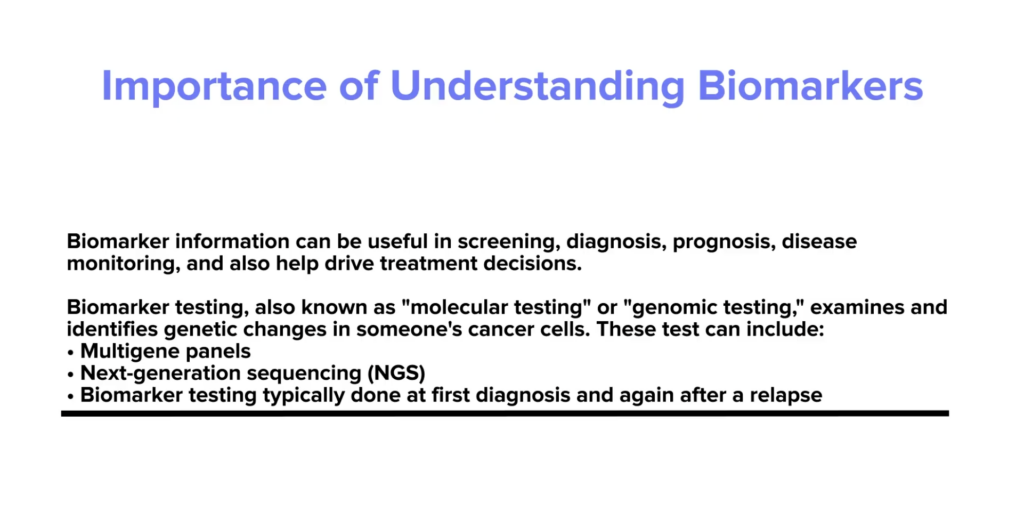
I believed that I was going to get through this, so I needed my friends and family to believe it, too.

My Treatment Plan and Remission
Right after my acute myeloid leukemia diagnosis, I started induction chemotherapy to try and get myself into remission. I also had my first long hospital stay. Thankfully, after that, I got into remission and then we waited for my first stem cell transplant. It takes a while to find a donor and coordinate the transplant, so in the interim, I had two rounds of consolidation chemotherapy, each round lasting one week, in the fall of 2023. I was in the hospital for about three weeks during that time.
I underwent the transplant and afterward, the doctors determined my chimerism. A chimera is an organism whose cells don’t all have the same DNA. When a patient receives a bone marrow transplant, they get stem cells from a donor that contain the donor’s DNA. The patient ends up with a mix of their own and the donor’s DNA. The higher the percentage of donor chimerism in the patient, the more donor cells they have and the better their outcomes could be. I had a 100% chimerism, which means I had 100% donor cells. I was also still in remission at this point.
Relapse
However, six months after my transplant in July 2024, I had a bone marrow biopsy and it revealed that my acute myeloid leukemia had relapsed on a molecular level. The doctors had observed a change in its molecular marker. Further tests found that 0.002% of my cells lit up for leukemia.
I underwent chemotherapy again to try to put me back in remission. I got two rounds of a lower-dose chemo medicine. Neither of them worked; my leukemia kept growing. At a certain point, it got to an 8% blast in my marrow — it was no longer just a molecular relapse but a full relapse.
I was admitted to the hospital again for more induction chemotherapy, but there were complications. I ended up in the ICU with pneumonia. Then, after I got out of the ICU, I had a bone marrow biopsy, which determined that the induction chemo had been ineffective.

I can’t think about my situation too much or it’ll overwhelm me. I have to stay positive. Otherwise, I’ll wallow in hopelessness and doom.
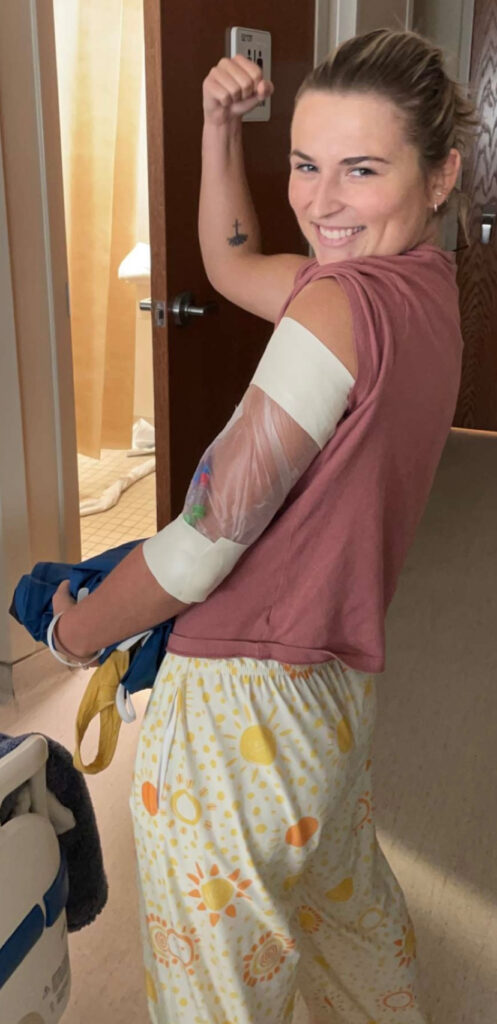
Frustration and Faith
That entire hospital stay was quite unpleasant. I couldn’t breathe on my own. I had to wear an adult diaper. And then after all that, my biopsy results came back and showed that I wasn’t in remission. I felt like I had undergone all of that for nothing. I felt doomed and hopeless. At a certain point, I felt like I was going to die and accepted that.
But my faith gave me some hope. The doctors sent me home and by the grace of God, I got on a clinical trial, which was about four weeks long. The results from that trial were inconclusive — it worked but not all that much. I’m in a new trial at MD Anderson in Texas. I’m still optimistic and I feel that this is where I’m supposed to be and that it’ll get me back into remission.
Having hope and faith has also helped my family get through this. We’re optimistic with every opportunity that God gives us.
I also realize that I can’t think about my situation too much or it’ll overwhelm me. I have to stay positive. Otherwise, I’ll wallow in hopelessness and doom. My family, friends, and husband matter very much to me, and I need to fight for them.
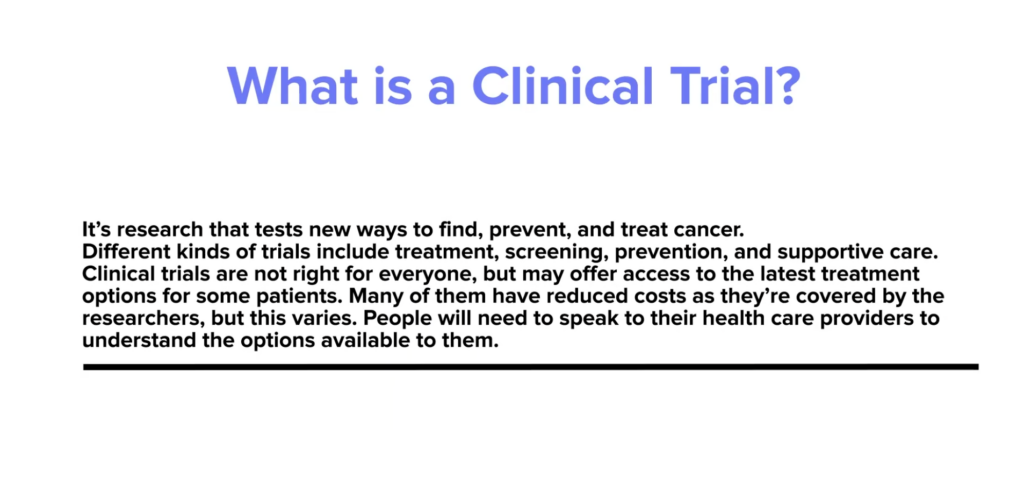
Clinical Trials and How I Feel About Them
When I got on my first clinical trial, the conversation I had centered around how the chemotherapy regimen I underwent for my acute myeloid leukemia wasn’t working any longer and that other types of chemo were too toxic for my body, especially given how tough my last hospital stay had been.
However, we had previously taken up the subject of clinical trials when I first relapsed and when the disease burden was lighter. Back then, the doctor laid out the chemo regimen and also said that clinical trials were available in case the chemo didn’t work.
A clinical trial is research that tests new ways to find, prevent, and treat cancer. Different trials include treatment, screening, prevention, and supportive care. Clinical trials are not right for everyone, but they can give patients access to the latest treatment options. Patients who join these trials may not have to pay full expenses because researchers may cover the costs, but this can vary. Patients will need to talk to their healthcare providers to understand the options they can access.


When standard treatments don’t work, doctors and patients can see if clinical trials can help. Fortunately, I joined one clinical trial and when that didn’t work, another one was available after I got discharged from my first trial.
Clinical trials make me a little nervous, like being a part of something that no one else has been a part of. But there’s a lot of science and research behind them, and they also start you depending on where you’re at in the trial. If, for instance, you come in right at the start of the trial, you begin with a small dose of the medicine, and as the trial progresses, the doses increase. That’s how they find the best dose of the drug — the effective amount that isn’t toxic or harmful.
I would urge those considering joining a trial to ask questions about it. Both the trials I joined have already been tried in other countries and are now being brought to the USA, so there’s already some data on their effects and how patients have responded to them.
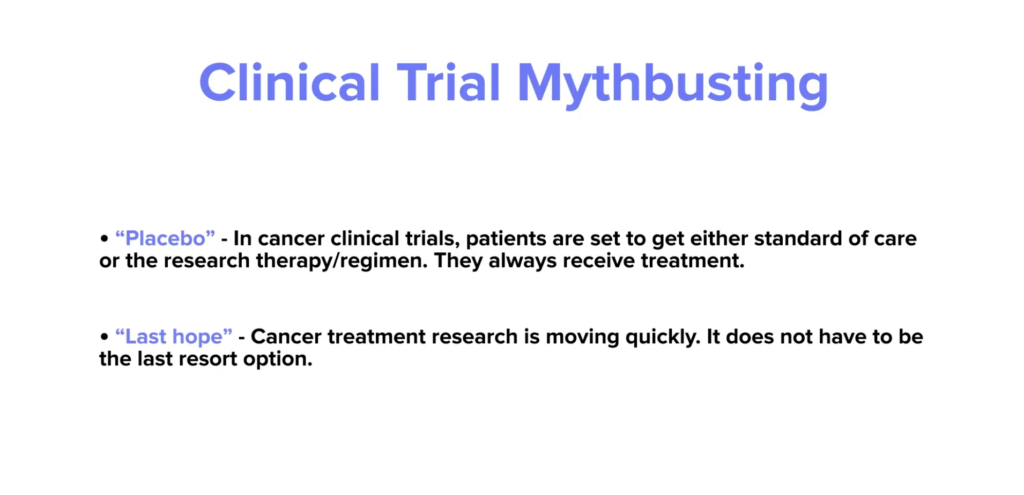
Realize this is bigger than you and out of your control. All you can do is your best.
How I’ve Responded to My Treatments
So far, the more treatments I’ve gotten for my acute myeloid leukemia, the harder it’s gotten for me. I struggle to do something as simple as standing in the kitchen to cut fruit. Sometimes I need to be in a wheelchair to attend appointments or to walk long distances, like in an airport.
That’s very frustrating because I joined three varsity teams in high school, played basketball in college, and was a runner. It’s hard and humiliating, but it also opens my eyes and helps me empathize with others who are dealing with chronic illnesses and who can’t do things the way they want to.
I try my best. I walk around when I feel good and rest when I need to. I also do chores around the house because those are exercises for me right now. Additionally, I should point out that I’ve been so blessed. My husband, friends, and family know when I need help and take on the little things that I find hard and are a burden to me now. They free me up to enjoy the things that make me happy.


From the perspective of my emotions, there are different stages. The first stage was losing a sense of myself in every aspect of my life. I was no longer a medical student, a runner, or a beautiful wife who goes out with her husband or meets up with her friends. There are lots of parts of me that I feel like I’ve lost and I’m reminded of that every time I look in the mirror.
When I was first diagnosed, I felt like I could overcome this — it’s not beating me, I’m not going to die from this, I’m going to have a low-risk mutation, I won’t need a stem cell transplant, the chemo is going to work immediately, I’m going to go right back to school. And that’s the second stage
Realize this is bigger than you and out of your control. All you can do is your best. Take care of yourself and your body. That’s when I dove into my faith and gave it all to God. I’m very type A and usually want to have control of my situation.
My Message of Hope
Every day, find something to be grateful for. Something that you love. Something that makes you happy, smile, or feel light. Live for it, no matter what it is. If you’re having a hard day and your mom makes you feel special, call her to brighten your day. Find something every day that gives you something to fight for.

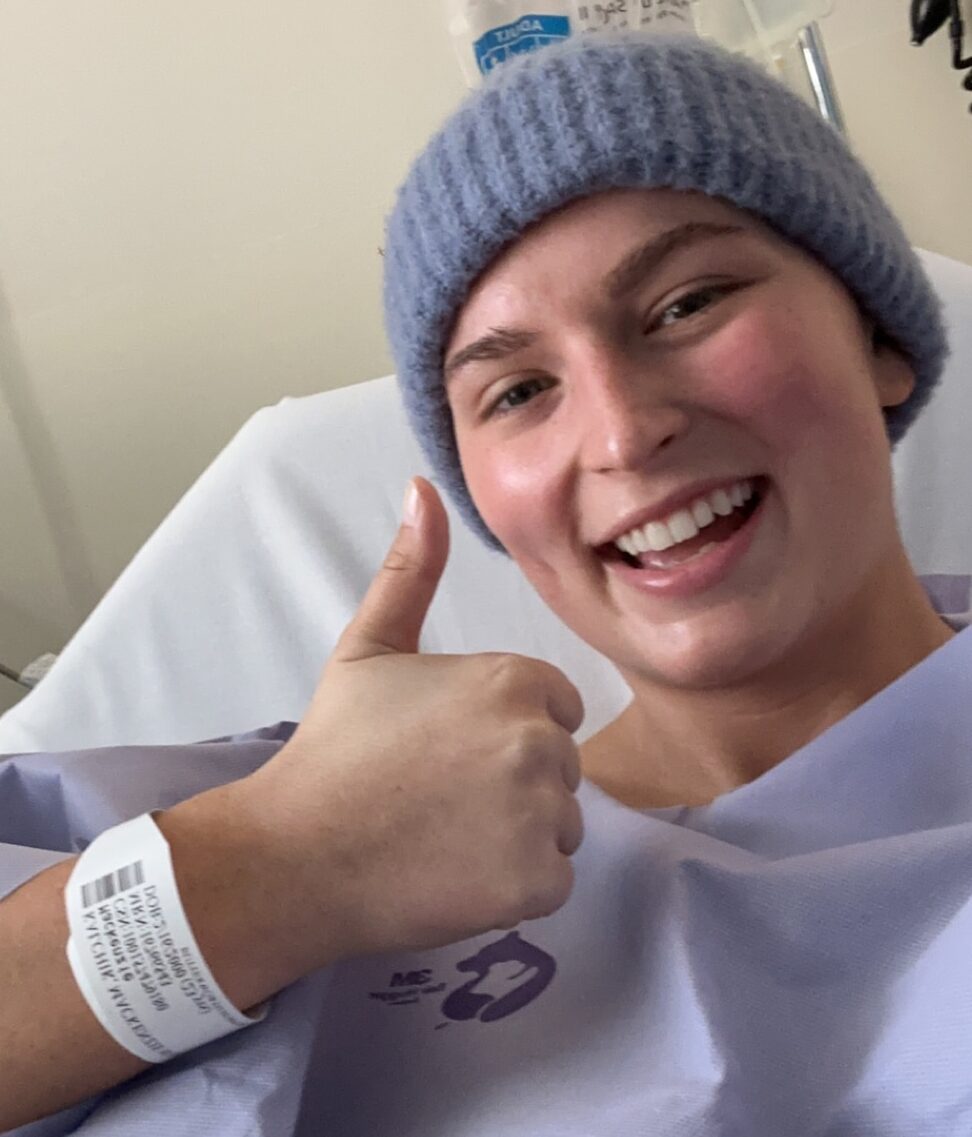

Special thanks again to Kura Oncology for supporting our patient education program. The Patient Story retains full editorial control over all content.

Inspired by Mackenzie's story?
Share your story, too!
More Acute Myeloid Leukemia (AML) Stories
Shelley G., Acute Myeloid Leukemia (AML) with NPM1 Mutation
Symptoms: Fatigue, rapid heartbeat, shortness of breath, low blood counts
Treatments: Chemotherapy, clinical trial, stem cell transplant
Joseph A., Acute Myeloid Leukemia (AML)
Symptoms: Suspicious leg fatigue while cycling, chest pains due to blood clot in lung
Treatments: Chemotherapy, clinical trial (targeted therapy, menin inhibitor), stem cell transplant
Mackenzie P., Acute Myeloid Leukemia (AML)
Symptoms: Shortness of breath, passing out, getting sick easily, bleeding and bruising quickly
Treatments: Chemotherapy (induction and maintenance chemotherapy), stem cell transplant, clinical trials
Grace M., Acute Myeloid Leukemia (AML)
Symptom: Headache that persisted for 1 week
Treatments: Chemotherapy, stem cell transplant








